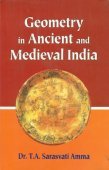Kshetraganita, Kṣetragaṇita, Kshetra-ganita: 7 definitions
Introduction:
Kshetraganita means something in Hinduism, Sanskrit. If you want to know the exact meaning, history, etymology or English translation of this term then check out the descriptions on this page. Add your comment or reference to a book if you want to contribute to this summary article.
The Sanskrit term Kṣetragaṇita can be transliterated into English as Ksetraganita or Kshetraganita, using the IAST transliteration scheme (?).
In Hinduism
Jyotisha (astronomy and astrology)
Source: Wikibooks (hi): Sanskrit Technical TermsKṣetragaṇita (क्षेत्रगणित).—Geometry. Note: Kṣetra-gaṇita is a Sanskrit technical term used in ancient Indian sciences such as Astronomy, Mathematics and Geometry.

Jyotisha (ज्योतिष, jyotiṣa or jyotish) refers to ‘astronomy’ or “Vedic astrology” and represents the fifth of the six Vedangas (additional sciences to be studied along with the Vedas). Jyotisha concerns itself with the study and prediction of the movements of celestial bodies, in order to calculate the auspicious time for rituals and ceremonies.
Ganitashastra (Mathematics and Algebra)
Source: archive.org: Science And Technology In Medievel India (Math)Kṣetragaṇita (क्षेत्रगणित) or Kṣetragaṇitaśāstra is a Sanskrit mathematical treatise dealing with the art of measuring lands, containing well-defined and established technical terms wanted for practical use in the Tamil language.—The work is mentioned in A. Rahman’s Science and Technology in Medievel India: A bibliography of source materials in Sanskrit, Arabic and Persian.

Ganitashastra (शिल्पशास्त्र, gaṇitaśāstra) refers to the ancient Indian science of mathematics, algebra, number theory, arithmetic, etc. Closely allied with astronomy, both were commonly taught and studied in universities, even since the 1st millennium BCE. Ganita-shastra also includes ritualistic math-books such as the Shulba-sutras.
Languages of India and abroad
Sanskrit dictionary
Source: DDSA: The practical Sanskrit-English dictionaryKṣetragaṇita (क्षेत्रगणित).—geometry.
Derivable forms: kṣetragaṇitam (क्षेत्रगणितम्).
Kṣetragaṇita is a Sanskrit compound consisting of the terms kṣetra and gaṇita (गणित).
Source: Cologne Digital Sanskrit Dictionaries: Monier-Williams Sanskrit-English DictionaryKṣetragaṇita (क्षेत्रगणित):—[=kṣetra-gaṇita] [from kṣetra] n. ‘calculating plane figures’, geometry.
[Sanskrit to German]
Sanskrit, also spelled संस्कृतम् (saṃskṛtam), is an ancient language of India commonly seen as the grandmother of the Indo-European language family (even English!). Closely allied with Prakrit and Pali, Sanskrit is more exhaustive in both grammar and terms and has the most extensive collection of literature in the world, greatly surpassing its sister-languages Greek and Latin.
Kannada-English dictionary
Source: Alar: Kannada-English corpusKṣētragaṇita (ಕ್ಷೇತ್ರಗಣಿತ):—[noun] the branch of mathematics dealing with the determination of length, area or volume; mensuration.
Kannada is a Dravidian language (as opposed to the Indo-European language family) mainly spoken in the southwestern region of India.
See also (Relevant definitions)
Partial matches: Kshetra, Ganita.
Starts with: Kshetraganitashastra.
Full-text: Unnata, Unnatavritta, Vritta, Caturbhuja, Trikona, Nimna, Ardhavritta, Cambuca, Cambucavritta, Nimnavritta, Vishama, Trisama, Sama, Samavritta, Dvisama, Ayatavritta.
Relevant text
No search results for Kshetraganita, Kṣetragaṇita, Kshetra-ganita, Kṣetra-gaṇita, Ksetraganita, Ksetra-ganita, Kṣētragaṇita; (plurals include: Kshetraganitas, Kṣetragaṇitas, ganitas, gaṇitas, Ksetraganitas, Kṣētragaṇitas) in any book or story.
Related products
